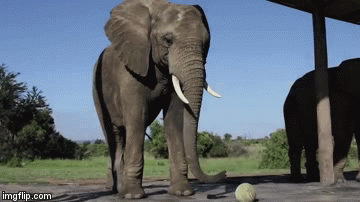What Do Elephants Do All Day? 2 Hours Of Sleep Leaves Time To Eat, Find Drinking Water, And Play

Two hours of sleep each night sounds like an awful way for a human to live, but it might be normal rest for elephants.
Researchers tracked two “wild, free-roaming African elephant matriarchs” in Botswana for a study in PLOS One to determine their activity levels throughout the day, with the help of a GPS collar and a more scientific version of the Fitbit fitness watches humans use to monitor their own activity levels, implanted into the elephants’ trunks.
Why the trunk? “We reasoned that measuring the activity of the trunk, the most mobile and active appendage of the elephant, would be crucial, making the reasonable assumption that if the trunk is still for five minutes or more, the elephant is likely to be asleep,” researcher Paul Manger said in a statement from Wits University in South Africa.
The two elephant leaders averaged two hours of sleep per day — and not even all at once; they accumulated the sleep between about 2 a.m. and 6 a.m., most often in a standing position.
Read: 25,000 Elephants Killed by Poachers
That's after a long day of eating and drinking, an elephant's most time-consuming activity. According to the World Wildlife Fund, African elephants mostly eat leaves and branches but may also feed on grass and fruit. They also spend time roaming to look for food and water sources, with occasional breaks to play.
According to the new PLOS One study, the females “displayed the shortest daily sleep time of any mammal recorded to date” and because they only slept lying down every three or four days, they might not often experience REM sleep, a deep form of sleep thought to be important for memory and learning. But elephants are known for their strong long-term memory, so the idea that they are not getting REM sleep raises questions about the little we think we know about the process.
Watch: An elephant wanted to play with a rhino. Oh dear.
The elephants could also go almost two days without sleep without needing to make up for lost time: “The amount of activity between sleep periods did not affect the amount of sleep.”
It is unclear, however, if the sleep patterns the researchers observed would extend to non-matriarch elephants, including males. Still, learning more about sleep in elephants, such as why and how they snooze, can help shape wildlife conservation and give scientists clues about human sleep.
“While there are many hypotheses regarding the function of sleep, the ultimate purpose of sleep is yet to be discovered,” Manger said.
See also:
© Copyright IBTimes 2024. All rights reserved.











